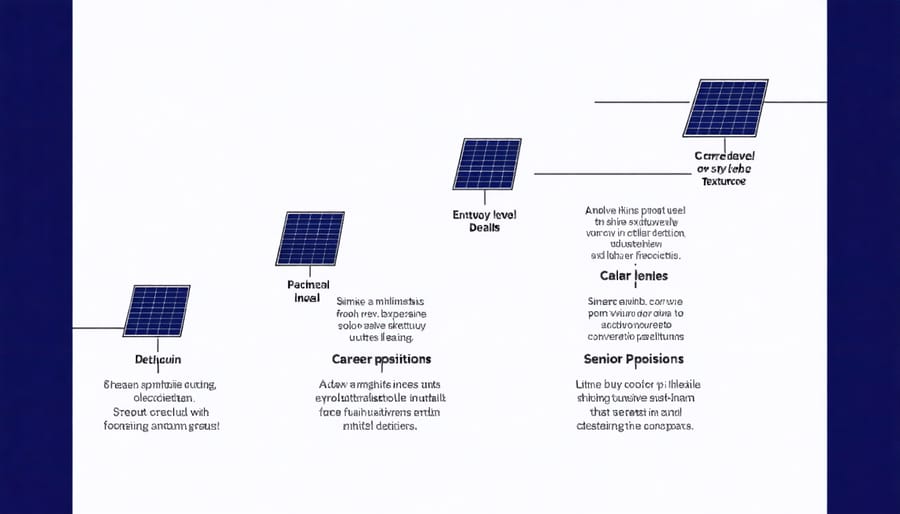Transform lives and build wealth as a financial planning professional in one of today’s most dynamic and rewarding career paths. Financial planners help individuals and businesses navigate complex financial decisions, create sustainable wealth strategies, and achieve long-term financial security.
With the growing complexity of investment options, retirement planning, and tax regulations, qualified financial planners are in higher demand than ever. The U.S. Bureau of Labor Statistics projects a 15% growth rate for personal financial advisors through 2031, significantly faster than the average for all occupations.
This career path offers multiple specialization opportunities, from retirement planning to estate management, with average salaries ranging from $87,850 to well over $200,000 for experienced professionals. Whether you’re a recent graduate, career changer, or experienced financial professional, the field provides clear advancement paths, flexible work arrangements, and the satisfaction of helping others achieve their financial goals.
Success in financial planning requires a unique blend of analytical skills, interpersonal abilities, and ethical judgment. Professionals typically hold certifications like the CFP® (Certified Financial Planner), while building expertise in investment strategies, tax planning, and risk management. The most successful planners combine technical knowledge with strong relationship-building capabilities to create lasting client partnerships.
The Evolution of Solar Financial Planning

Market Growth and Career Opportunities
The financial planning sector within the solar industry is experiencing remarkable expansion, driven by increasing renewable energy adoption and environmental consciousness. Recent data shows solar industry job growth outpacing traditional energy sectors, with financial planning roles becoming increasingly vital.
Career opportunities are particularly robust in solar project financing, investment advisory, and sustainable portfolio management. Financial planners specializing in solar installations can expect competitive salaries ranging from $65,000 to $120,000 annually, depending on experience and location. The demand for professionals who understand both financial principles and renewable energy technologies continues to rise.
Major financial institutions are expanding their sustainable energy divisions, creating new positions for specialists in solar financing, risk assessment, and investment strategy. Additionally, independent consulting opportunities are growing as more homeowners and businesses seek expertise in solar investment decisions. With federal incentives and increasing corporate commitment to renewable energy, the career outlook for solar financial planners remains exceptionally positive for the next decade.
Key Skills and Qualifications
Success in solar financial planning requires a unique blend of financial expertise and industry-specific knowledge. Essential qualifications include a bachelor’s degree in finance, economics, or business administration, with many professionals pursuing advanced certifications like the Certified Financial Planner (CFP) designation or specialized renewable energy certificates.
Strong analytical skills are crucial for evaluating solar projects, calculating ROI, and assessing risk factors. Financial planners must excel at number crunching while maintaining attention to detail when reviewing complex financial documents and regulatory requirements.
Effective communication skills are vital, as professionals regularly explain technical concepts to clients, present investment opportunities, and coordinate with installation teams. Understanding of solar technology, renewable energy policies, and available incentives is essential for providing accurate guidance.
Computer proficiency, particularly with financial modeling software and renewable energy assessment tools, is necessary. Additionally, staying current with evolving solar technologies, market trends, and regulatory changes through continuous education is important for long-term success.
Knowledge of tax implications, rebate programs, and financing options specific to solar investments rounds out the key competencies needed in this growing field.
Core Career Paths in Solar Finance
Solar Investment Advisor
A Solar Investment Advisor combines financial expertise with renewable energy knowledge to help clients make informed decisions about solar investments. These professionals evaluate property potential, analyze energy consumption patterns, and create comprehensive financial models to determine the viability of solar installations.
Key responsibilities include conducting site assessments, calculating potential energy savings, analyzing tax incentives and rebates, and developing customized financial strategies for solar investments. They work closely with homeowners, businesses, and institutional investors to maximize returns on solar investments while considering factors like installation costs, maintenance expenses, and energy production estimates.
The career path typically begins with a bachelor’s degree in finance, economics, or renewable energy, often complemented by certifications in financial planning or solar energy. Entry-level positions usually start in general financial planning or solar sales, progressing to specialized solar investment advisory roles with experience.
Career advancement opportunities include moving into senior advisory positions, managing solar investment portfolios for large institutions, or establishing independent consulting practices. Many advisors also transition into roles with solar development companies or renewable energy investment firms.
The growing focus on sustainable energy and green investments has created strong demand for these specialists. Successful advisors can expect competitive compensation, with earnings increasing significantly with experience and proven track record in solar project financing.

Solar Project Finance Manager
Solar Project Finance Managers play a crucial role in making renewable energy initiatives financially viable. These professionals combine financial expertise with sustainable energy knowledge to oversee the funding and financial planning of solar installations, from residential projects to utility-scale developments.
The position typically requires a bachelor’s degree in finance, economics, or business administration, with many employers preferring candidates who also have a master’s degree or specialized certification in renewable energy finance. Experience in project management and understanding of solar technology are valuable assets.
Key responsibilities include conducting financial feasibility studies, developing project budgets, structuring finance deals, and managing relationships with investors and stakeholders. These professionals analyze risks, create financial models, and ensure projects meet return-on-investment targets while complying with regulatory requirements.
The compensation is competitive, with annual salaries ranging from $85,000 to $150,000, depending on experience and location. The career outlook is particularly bright, with the solar industry’s continued growth driving demand for financial expertise.
Success in this role requires strong analytical skills, attention to detail, and the ability to navigate complex financial instruments. Knowledge of tax incentives, renewable energy credits, and government programs is essential. Additionally, excellent communication skills are necessary to explain complex financial concepts to diverse stakeholders.
The role offers opportunities for advancement into senior management positions or specialized consulting roles within the renewable energy sector.
Residential Solar Financial Consultant
As the solar industry continues to expand, Residential Solar Financial Consultants have emerged as crucial professionals helping homeowners navigate the transition to clean energy. These specialists combine financial planning expertise with in-depth knowledge of residential solar innovations to create customized financing solutions for homeowners.
The role involves analyzing household energy consumption, evaluating property specifications, and designing financial plans that maximize solar investment returns. Consultants work closely with clients to explain various financing options, including solar loans, leases, power purchase agreements (PPAs), and available tax incentives.
Success in this field requires a unique blend of skills: financial analysis expertise, knowledge of solar technology, and strong interpersonal abilities. Most professionals hold degrees in finance, business, or related fields, often complemented by solar industry certifications. Starting salaries typically range from $50,000 to $75,000, with experienced consultants earning well over $100,000 annually.
The career outlook is particularly bright, driven by increasing homeowner interest in sustainable energy and favorable government policies. Many consultants work with solar installation companies, financial institutions, or establish their own consulting practices. The position offers both the satisfaction of helping families achieve energy independence and the opportunity to contribute to environmental sustainability while building a rewarding career in renewable energy finance.
Breaking Into Solar Finance

Education and Certification Requirements
A bachelor’s degree in finance, economics, business, or a related field is typically the minimum educational requirement for entering the financial planning profession. Many successful planners also pursue advanced degrees like an MBA to enhance their expertise and career prospects, especially when focusing on solar career opportunities and sustainable investments.
The Certified Financial Planner (CFP) designation is considered the gold standard in the industry. To earn the CFP, candidates must complete a comprehensive education program, pass a rigorous examination, and acquire three years of professional experience. Additional valuable certifications include the Chartered Financial Analyst (CFA) for investment specialists and the Chartered Financial Consultant (ChFC) for insurance and estate planning experts.
For those specializing in sustainable finance, certifications like the Sustainability and Climate Risk (SCR) Certificate or the Green Finance Certificate can provide valuable expertise. Many employers also value professional memberships in organizations such as the Financial Planning Association (FPA) or the National Association of Personal Financial Advisors (NAPFA).
Continuing education is crucial in this field, as regulations, investment products, and market conditions constantly evolve. Most certifications require ongoing education credits to maintain active status, ensuring professionals stay current with industry developments and best practices.
Networking and Industry Connections
Success in financial planning, particularly in the solar sector, heavily relies on building and maintaining strong professional relationships. Industry associations like the Solar Energy Industries Association (SEIA) and the Financial Planning Association (FPA) offer valuable networking opportunities through conferences, webinars, and local chapter meetings.
LinkedIn has become an essential platform for connecting with solar finance professionals and staying updated on industry trends. Regular participation in renewable energy forums and sustainability-focused financial planning groups can lead to mentorship opportunities and potential job leads.
Professional certifications, such as the Certified Financial Planner (CFP) designation or specialized renewable energy credentials, not only enhance your expertise but also provide access to exclusive networking events and communities. These connections often prove invaluable when seeking career advancement or exploring new opportunities in solar finance.
Consider joining clean energy advocacy groups and attending green business conferences to expand your network beyond traditional financial circles. Many successful solar financial planners also maintain relationships with solar installers, equipment manufacturers, and policy advocates to better serve their clients.
Remember to give back to the community by mentoring newcomers and sharing your expertise. This approach not only strengthens your professional network but also helps establish you as a thought leader in the growing field of solar finance.
Future Growth and Industry Outlook
The financial planning industry is experiencing robust growth, particularly in sectors focused on sustainable investments and renewable energy. According to the Bureau of Labor Statistics, employment for personal financial advisors is projected to grow 15% through 2031, significantly faster than the average for all occupations. This growth is driven by an aging population seeking retirement guidance and increasing interest in sustainable investment options.
Career advancement opportunities in financial planning are diverse and promising. Many professionals start as junior advisors or analysts before progressing to senior advisory roles, eventually managing their own practice or specializing in niche markets like sustainable finance. The integration of renewable energy investments, particularly solar, has created new specialization opportunities for financial planners who understand both traditional finance and green technology markets.
Recent policy changes affecting solar careers have opened up additional opportunities for financial planners who specialize in renewable energy investments. These professionals can help clients navigate tax incentives, renewable energy credits, and sustainable investment portfolios.
Technology is reshaping the industry, with artificial intelligence and digital platforms complementing rather than replacing human advisors. This evolution means financial planners must continuously adapt their skills, combining traditional financial expertise with digital literacy and sustainable investment knowledge.
The demand for specialized financial planners who understand both conventional financial planning and renewable energy markets is expected to grow significantly. As more homeowners and businesses invest in solar installations and sustainable technologies, financial planners who can guide these investments while maintaining a holistic view of clients’ financial health will be particularly valuable.
Compensation in the field remains competitive, with experienced professionals often earning six-figure incomes through a combination of fees and commissions. Those who develop expertise in sustainable investments and solar financing often command premium rates due to their specialized knowledge.
A career in financial planning offers a rewarding path for those who enjoy helping others achieve their financial goals while building a stable and lucrative profession. As we’ve explored throughout this article, the field combines analytical skills, interpersonal abilities, and ongoing education to create a dynamic career opportunity.
The growing demand for qualified financial planners, coupled with an aging population and increasing financial complexity, makes this an excellent time to enter the profession. Whether you choose to work with an established firm, start your own practice, or specialize in a particular area of financial planning, the opportunities for growth and success are substantial.
To begin your journey, consider taking these actionable steps: First, evaluate your current qualifications and determine which certifications you’ll need to pursue, with the CFP® designation being a primary goal. Second, gain practical experience through internships or entry-level positions at financial firms. Third, build your network by joining professional organizations and attending industry events.
Remember that success in financial planning requires more than just technical knowledge – it demands a genuine commitment to helping clients, strong ethical standards, and excellent communication skills. With dedication and the right preparation, you can build a fulfilling career that offers both personal satisfaction and financial rewards. Take the first step today by researching certification programs and connecting with professionals in the field.









